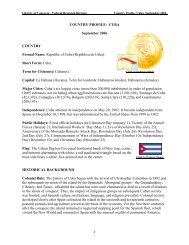1 - American Memory
1 - American Memory
1 - American Memory
Create successful ePaper yourself
Turn your PDF publications into a flip-book with our unique Google optimized e-Paper software.
256<br />
modlHes as well as other specialized services for the carriage ot antomobUes and<br />
raw sugar, fuel oil and molasses in bulk.<br />
Matson's present fleet consists of 15 vessels Including two hl^ capacity, higji<br />
speed container vessels originally placed Into service in 1970 plus two equally<br />
modern trailer vessels commonly referred to as roll-on roll-off vessels which were<br />
added to our fleet In 1978. The current book value of Matson's Investment, in-<br />
cluding capitalized lease values, approximates $186,600,000.<br />
In addition to Matson, the State of Hawaii is served from U.S. Pacific<br />
Coast ports bv U.S. Lines, three common carrier barge operators, and two<br />
proprietary barge operators. In the Guam trade, service is provided by Matson,<br />
U.S. Lines and until recently Pacific Far East Lines.<br />
Matson is a member of the Pacific Maritime Association, a west Coast<br />
employer group, which negotiates, on behalf of its membership, collective bar-<br />
gaining agreements with longshore and offshore maritime unions. The organiza-<br />
tion and structure of the PMA. including Us voting procedures. Is set out in<br />
an agreement which Is filed with the Federal Maritime Commission for their<br />
approval pursuant to Section 15 of the Shipping Act, 1916. With enactment of<br />
this legislation the PMA's participation in the collective bargaining process<br />
would continue to be governed by the existing approved agreement.<br />
The PMA has previously testified in opposition, to this legislation. Matson's<br />
appearance in support of this legislation is reflective of the fact that we have<br />
a different constituency than the other members of the PMA, all of whom<br />
are entirely or primarily engaged in the foreign commerce. As previously<br />
indicated Matson's operations are concerned solely with providing service to<br />
and from the major domestic offshore communities or areas embraced by the<br />
bill. Matson's constituency—its rate paying consignees—expect Matson to sup-<br />
port this legislation which they as residents of those communities view as a<br />
means of being freed of their role as hostages to collective bargaining decisions<br />
made by non-residents on the Pacific Coast.<br />
Those opposing this legislation, both management and labor, claim that its<br />
enactment and operation would weaken the economic bargaining power of each<br />
or conversely strengthen the other party's position and thus adversely affect<br />
the collective bargaining process. If that process is to be substantially affected<br />
by this legislation, either labor or management must realize from it some<br />
advantage or disadvantage that will be substantially detrimental or helpful to<br />
the interests of the other; it is clear that this will not be the result of the<br />
legislation.<br />
All collective bargaining agreements negotiated by the PMA must be ratified<br />
by its membership. Of the 130 members of the Association who are qualified<br />
to vote on questions Involving shoreside or longshore labor, only Matson is<br />
solely involved in providing service between the U.S. Pacific Coast and the<br />
U.S. Pacific islands specified in the bill. The votes available for casting on such<br />
questions total 699, of which only 50 are held by Matson; on questions involving<br />
the offshore unions, that is, shipboard personnel who are involved in the opera-<br />
tion of the vessels, the votes available to be cast in respect to such questions<br />
total 31 of which only 3 can be cast by Matson. Under the provisions of the bill,<br />
the governor of Hawaii for example Is given permissive authority to seek an<br />
Injunction for the purpose of bringing about a resumption of ocean carrier<br />
service between the State and the ports of the U.S. Pacflic Coast. Because of<br />
the permissive nature of such authority the bill does not guarantee that there<br />
will be no Interruption in such service as a result of a Pacific Coast longshore<br />
or off.shore union strike; but if and when the governor elects to obtain such<br />
an injunction, Matson and competing carriers wou'd then resume operations<br />
while the balance of operations at Pacific Coast ports would continue to be<br />
strike-bound. In view of its minority voting position within PMA, It is clear<br />
that Matson would not be able to translate the financial benefits of such resumed<br />
operations into a determinative control over the timing or substance of the<br />
collective bargaining process or the uIMmate resolution of the dispute.<br />
If the governor acts and Matson resumes operations, what then would be<br />
Matson's negotiating stance within PMA during such period of resumed opera-<br />
tions? Under Section 2(b) (2) of the bill, Matson will be obligated to pay retro-<br />
actively the addtional wages represented by the difference between the wage<br />
provided for employees under the agreement resolving the labor dispute and the<br />
wage such employee actually received during the period of resumed operations



![Albert Einstein Papers [finding aid]. Library of Congress. [PDF ...](https://img.yumpu.com/21604228/1/190x245/albert-einstein-papers-finding-aid-library-of-congress-pdf-.jpg?quality=85)





![American Colony in Jerusalem Collection [finding aid]. Library of ...](https://img.yumpu.com/17941275/1/190x245/american-colony-in-jerusalem-collection-finding-aid-library-of-.jpg?quality=85)



![Piccard Family Papers [finding aid]. - American Memory - Library of ...](https://img.yumpu.com/17941234/1/190x245/piccard-family-papers-finding-aid-american-memory-library-of-.jpg?quality=85)


